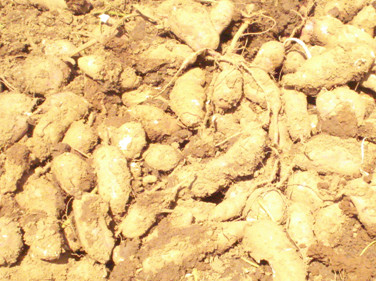 Magsasaka Siyentista (farmer-scientist) Victor Hernandez conquered the feathery mottle virus (FMV) in his sweetpotato farm in Brgy.Parang, Bagac, Bataan. He did this by adopting science and technology interventions that come with the establishment of PCARRD’s Science and Technology-based Farm (STBF).
Magsasaka Siyentista (farmer-scientist) Victor Hernandez conquered the feathery mottle virus (FMV) in his sweetpotato farm in Brgy.Parang, Bagac, Bataan. He did this by adopting science and technology interventions that come with the establishment of PCARRD’s Science and Technology-based Farm (STBF).
Hernandez observed that his sweetpotatoes did not show any presence of FMV, which is associated with the leaf curl known as “lusaw”. This, Hernandez shared during an STBF technology field day held in his farm on November 12.
 Guests composed of farmers, local government officials, PCARRD staff members, and representatives from the Bataan Peninsula State University (BPSU) bore witness to Hernandez’s testimony upon seeing the good agronomic performance of his crops. According to Hernandez, healthy plants mean higher yields, which translate to bigger income.
Guests composed of farmers, local government officials, PCARRD staff members, and representatives from the Bataan Peninsula State University (BPSU) bore witness to Hernandez’s testimony upon seeing the good agronomic performance of his crops. According to Hernandez, healthy plants mean higher yields, which translate to bigger income.
Dr. Hermogenes Paguia, BPSU associate director for extension and Techno Gabay team leader, explained that the STBF interventions Hernandez adopted includes the use of clean planting materials, application of fertilizer, and rouging. Paguia also encouraged the farmers in attendance to adopt Hernandez’s new-found practice, particularly the use of clean planting materials. He also expressed optimism in the farmer-adoptors and researchers in Bataan in becoming sources of clean planting materials for sweetpotatoes.
Sweetpotato is a widely cultivated cash crop and considered a traditional food crop in the countryside because of its ability to adapt to marginal environment. However, it is threatened with FMV or “kamote kulot” in the local parlance.
Now, sweetpotato is recognized as an industrial commodity for value-added foods, feeds, starch products, and biofuel. With STBF, good yield and sustained production of this rootcrop is possible. Take it from Magsasaka Siyentista Victor Hernandez.
